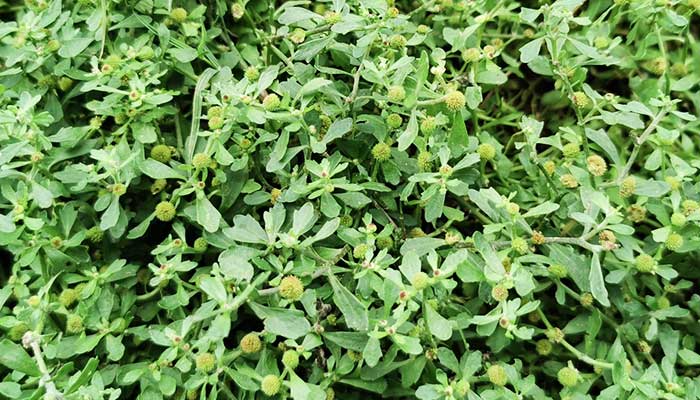What Is E Bu Shi Cao
E Bu Shi Cao is commonly known as Centipeda minima, which is an annual herb belonging to the Asteraceae. It is a relatively practical and common Chinese herbal medicine, which first appeared in <Shi Xing Ben Cao> (Food Properties Materia Medica) in the Tang Dynasty (around 937-957 AD).
Centipeda minima is a common weed, which is distributed in tropical areas of East Asia, Southeast Asia, and Oceania.
Because of their certain aggressiveness, they are rarely introduced into planting.
This plant likes a humid environment. They often grow on the sides of aquatic vegetables, rice, and soybean fields.
From May to June every year, people gather all the parts of Centipeda minima, remove the sediment, wash them with water, use them directly, or dry them, and make them into Chinese herbal medicines.

E Bu Shi Cao contains a lot of volatile oil, and its components include eucalyptol, camphor, verbenol, carvacrol, and carypohyllene. In addition, it also contains sesquiterpenes, diterpenes, triterpenes, dandelion sterol, β-sitosterol, γ-spinachsterol, taraxasteryl acetate, taraxasteryl palmitate, arnidiol, quercetin, benzoic acid, palmitic acid, artemisinic acid, thymol, α-cyperone, tannins, resins, dinatin, and uracil.
Generally, fragile and yellow-white E Bu Shi Cao with a cross-section is preferred.
According to <Compendium of Materia Medica>, the medicinal nature of E Bu Shi Cao is relatively warm, with a pungent taste. It has a certain therapeutic effect on the pathological changes of the lung and liver meridians.
In traditional Chinese medicine, it is often used to disperse wind and cold, relieve stuffy nose, relieve cough and remove toxins, treat whooping cough, gallstones, acute rhinitis, chronic simple rhinitis, hypertrophic rhinitis, allergic rhinitis, chronic bronchitis, conjunctivitis, vaginitis, pelvic inflammatory disease, chronic pelvic inflammatory disease, fungal vaginitis, eczema, malaria, soft tissue injury, rheumatic arthralgia, peripheral facial nerve palsy, and hookworm cercariae infection.
There are about 50 kinds of Chinese medicine prescriptions containing it, such as Zhonghua Dieda Wan, Xinyi Biyan Wan, and Bi Tong Wan.
Benefits
- Anti-inflammation, inhibiting xylene-induced mouse ear swelling and egg white-induced rat foot swelling.
- Anti-oxidation, scavenging DPPH free radicals.
- Raising the pain threshold and inhibiting the pain caused by the hot plate experiment in mice.
- Inhibiting the contraction of guinea pig isolated tracheal smooth muscle caused by chloroacetylcholine or histamine phosphate, and relieving asthma.
- Reducing liver damage in mice induced by CCL4, acetaminophen, D-galactosamine, and lipopolysaccharide, and protecting the liver.
- Dispersing wind and cold, treating nasal congestion and runny nose caused by wind-cold.
- Relieving stuffy nose, and treating nasal polyps, nasosinusitis, and headache.
- Reducing phlegm, treating cough and excessive phlegm caused by cold phlegm.
- Removing toxins to subside swelling, treating skin ulcers and abscesses.
- Inhibiting the proliferation of nasopharyngeal carcinoma CNE-1 and CNE-2 cells, cervical cancer Hela cells, liver cancer HepG2 cells, and induce apoptosis of leukemia HL60 cells, colon cancer CT26 and HT-29 cells.
- Its volatile oil can relieve nasal obstruction, reduce the amount of eosinophils in peripheral blood vessels, nasal secretions, and nasal mucosa tissue, reduce the amount of mucosal histamine, and treat allergic rhinitis.
- Its decoction has a certain inhibitory effect on Staphylococcus aureus, Escherichia coli, Bacillus subtilis, Micrococcus luteus, and Proteus.
- Studies have found that its decoction has a strong elimination effect on the R plasmid of Pseudomonas aeruginosa. As time goes on, its elimination effect is also significantly enhanced.
Combinations
- It can be used in combination with Xi Xin (Asari Radix et Rhizoma), Bai Zhi (Radix Angelicae Dahuricae), Cang Er Zi (Fructus Xanthii), etc. to treat headache, nasal congestion, and runny nose caused by wind-cold.
- It can be used in combination with Bo He (Mentha), Huang Qin (Radix Scutellariae), Ju Hua (Flos Chrysanthemi), etc. to relieve nasal congestion, runny nose, and headache caused by wind-heat.
- It can be used in combination with Ma Huang (Ephedra), Xi Xin (Asari Radix et Rhizoma), Bai Bu (Radix Stemonae), etc. to treat cough and phlegm caused by cold phlegm.
- It can be used in combination with Chuan Xiong (Rhizoma Chuanxiong), Bai Shao (White Peony Root), Quan Xie (Mesobuthus Martensii), Man Jing Zi (Vitex Fruit), etc. to treat migraine.
- It can be used in combination with Bai Fu Zi (Typhonii Rhizoma), Quan Xie (Mesobuthus Martensii), Jiang Can (Bombyx Batryticatus), Fang Feng (Radix Saposhnikoviae), etc. to treat facial paralysis.
Side Effects
- At present, there is no report in the literature that it has toxic effects.
- Overdose may cause nausea, vomiting, acute abdominal pain, or gastric discomfort, and other adverse reactions.
Precautions and Warnings
- The dosage of E Bu Shi Cao should be controlled at 6-9g.
- It can be made into decoctions, powders, or mashed for external use.
- People who are allergic to geese non-grass should not take it.
- Avoid taking its decoction on an empty stomach.
- People with internal heat due to yin-deficiency should not take it.
- People with weakness of the spleen and the stomach should not take it.
- People with stomach ulcers and gastritis should not take it.
- Pregnant women and breastfeeding women should take it under the guidance of a doctor.
